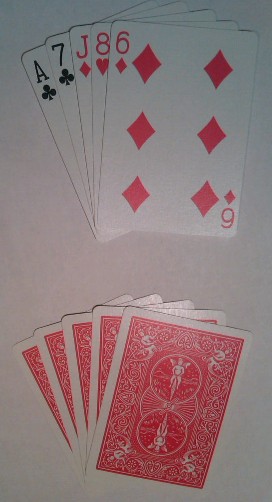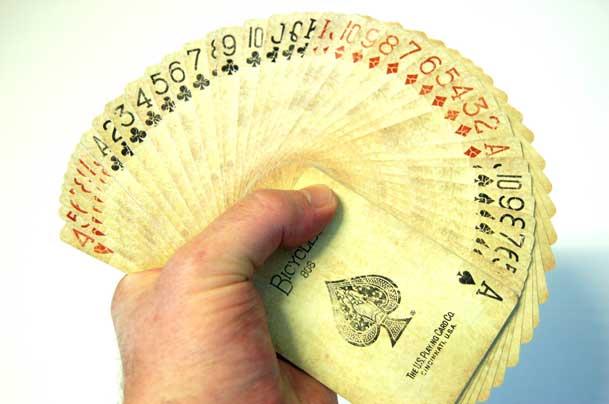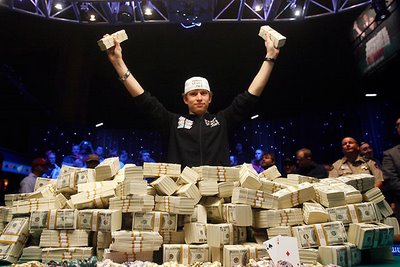The original question was: [My wife and I] always shuffle the deck at least 4-5 times before dealing. But I’m sure that’s not enough and need some guidance. Does the game previously played influence the amount of shuffling required to ensure a random deck?
But the bigger debate is that my wife prefers to deal two cards at a time so as to make the dealing go faster, while I prefer to deal the cards one at a time even though it takes longer. My preference for one card at a time is entirely based on the belief that it creates a more random distribution of cards, a cleaner deal. What is the impact of dealing one vs two cards at a time?
Can any of this be proven mathematically?
Physicist: Unless one of you is a card shark, you should be fine. The short answer is; random is random, and how you deal has no impact on that.
Starting with a perfectly ordered deck you can randomize it, about as much as you’d need, in 6-7 perfect shuffles. This is enough to get cards that start right next to each other to end up anywhere in the deck (each shuffle doubles the distance between cards). There are some subtle patterns still retained by perfect shuffles (that are unlikely to affect any game likely to be played), so if you want to avoid them you can purposely mess up a shuffle, or cut the deck at random after a shuffle or two.
The way that these patterns would be noticeable is if you play a game that completely orders the deck somehow, like klondike, in which case a series of perfect shuffles does create a fairly random deck, but it will be the same random deck every time.

A fresh pack after 7 perfect “pharaoh” shuffles. There are some patterns, but not the kind of patterns that you’d notice in most games.
The way you’d notice (assuming you’re proficient enough to shuffle perfectly, every time) is you’ll find yourself playing the same game over and over. However, adding a few genuinely random elements to a few shuffles: cutting the deck at a random location in between shuffles, not doing the shuffle perfectly, or “mixing” the cards on the table, do a really good job killing off any remotely recognizable patterns that might carry over from a previous game. But for most games, at the end of a hand/round the cards are already patternless enough that a few shuffles is more than fine. “Awesome handedness” isn’t a pattern that survives shuffling.
Once a deck has been randomized all dealing patterns are equivalent. Every set of cards is just as likely to show up as every other whether you deal one card at a time, 5 cards at a time, deal clockwise/counter-clockwise, or just deal as weirdly as possible. It’s fair to say that if someone gets 3 royal flushes in a row, it’s not because the cards are retaining a pattern. That dude’s just cheating.
In general, you can create noise from pattern, but not pattern from noise. In other words, to create patterns on purpose, you’d need to actually sort the cards by hand.

By shuffling you can sort the cards on the top, because you’ll know when to stop. But there’s no way to sort the cards on the bottom.
There are big branches of mathematics that cover this sort of thing (not cards specifically). While the patterns in the cards never quite go away completely, you can certainly say “more than good enough” or “it would take billions of games to notice anything” after not too many shuffles.
Answer gravy: If you really want to, there are ways to construct fairly artificial examples in which patterns do last from one game to the next. These are also the basis of several “trickless” card tricks. For example:
You have exactly 2N players, each with H cards in their hand, who play a round and then place their hands on the top of the deck. The dealer does exactly N pharaoh shuffles and deals again, one card at a time. If , then you’ll find that the hand that was on the very top of the deck will be dealt to the last person in the dealing order, and everyone else will end up with new cards.
So if there are 4 players, each with 5 cards, the last last hand to be put on the top of the deck will be in positions 1, 2, 3, 4, 5. The first pharaoh shuffle will move these to 2, 4, 6, 8, 10 and the second will move them to 4, 8, 12, 16, 20. When dealing;
player one gets cards 1, 5, 9, 13, 17
player two gets cards 2, 6, 10, 14, 18
player three gets cards 3, 7, 11, 15, 19
player four get cards 4, 8, 12, 16, 20 (the last hand from the previous game)
However, this “trick”, and pretty much every other, is defeated immediately by having someone cut the deck. Also, don’t ever play cards with Magicians, they think about this stuff more than you might suspect.









all is very fruitfull
Best method is to throw all the cards up in the sky like crazy random monkeys (WITHOUT MARKING THEM), catch them in a bag, stack them and deal one by one.
It’s only a tiny bit of more work.
I was expecting to see here the typical anecdotal result due to Bayer and Diaconis that 7 “typical” riffle shuffles are necessary to randomize a deck. Explaining the mathematics behind this result to friends isn’t always easy; fortunately, there are some nicer, simpler explanations justifying smaller numbers of shuffles (including a very cool magic trick), explained in more detail here.
We are trying to settle an argument with our phd in physics and math brother in law . We say after the cards are shuffled, rules of a particular game dictate the order in which they are dealt even. We know cutting the deck is mainly done to prevent cheating but if that is done, the hand should still mbe dealt in the proper order. That order being one at a time beginning with the player to the dealer’s left. He says it is random and it does not matter who gets what hand. However, card games have rules and we maintain you should get the hand you are supposed to get on a particular hand. After all, a big part of card games is luck and part of the luck is where you are seated because it dictates what cards you will get fron any shuffled deck.
We are not talking about the probability of millions of hands, we are talking about each individual hand. The one we are playing. Are we way off the track on this one?
This is a good question. Unfortunately, your brother-in-law is correct… or at least, he has a point. Having said that, *you* are correct in that you should follow the rules of the game, and if the rules dictate that the dealer deals clockwise starting from his left, then deal clockwise starting from your left. And for a particular shuffled deck, if you deal the cards differently, players will obviously end up with different hands, with a different end result of the round.
But your brother-in-law is correct in that it actually makes no difference, in the sense that the order of cards dealt confers no advantage (or disadvantage) on any individual player(s)… at least, *assuming* two important properties: (1) no one is trying to cheat, and (2) the cards are truly “completely” shuffled, i.e. every arrangement of the cards in the deck is equally likely. (Using a typical riffle shuffle, this can take longer than many people realize; see my earlier comment for more discussion about this.)
To see why, consider the last 100 years or so of people playing bridge, for example. Suppose that in all of those thousands (millions?) of past games, each deck was *shuffled* in exactly the same way as it was before, but that instead of dealing clockwise, everyone always dealt counter-clockwise. In other words, consider an “alternate universe” where every shuffled deck has the same order of cards as it did in our “real” universe, but the dealing order is different.
Your point is that every one of those games would have turned out differently than they “really” did, and you’re right. Some players that won in our real universe would lose in the alternate, and vice versa. But your brother-in-law’s point is that no one would have complained. That is, the fairness of the game does not depend on the dealing order. A player that won in the real universe but lost in the alternate also *wins* some games that he “really” lost… and these two effects exactly cancel each other out.
There is a more detailed discussion of exactly this issue here, which uses a simple “thought experiment” game to illustrate the concept.
I wish it were true that no one would complain if the cards were dealt in an order other than dictated by the rules of the game, but someone did complain and that is exactly how the discussion started. To prove his point he said he would change places with me at the table the next hand. We switched seats and the cards were dealt in order beginning with the player on the left of dealer and I was the big winner. If we had not switched, he would had the cards to win. My point is, on a particular hand, the order in which they are dealt makes a difference.
I think I did not describe my suggested “alternate universe” clearly enough. The idea is that in this alternate universe, the rules are different; i.e., the rules state that dealing is counter-clockwise. My point was that no one would “realize” that they were in an alternate universe, or find the game inferior in any way, or think that the game would somehow be “better” or fairer if the rules were changed “back” so that dealing was clockwise, because the probability of any particular player winning the hand is no different than it would be in “our” universe.
“If we had not switched, he would had the cards to win. My point is, on a particular hand, the order in which they are dealt makes a difference.” I think we are in violent agreement here. I am not disputing (nor, I imagine, is your brother-in-law disputing) that, looking back on any past hand, if you changed the dealing order the outcome of the hand would have been different… but before the hand we never know which dealing order corresponds to us winning or losing. In other words, changing the dealing order does not help– or hurt– our chances in any way that we can predict or take advantage of, so what difference does it make?
I have found that the most vivid illustration of any idea concerning probability is to bet on it. Consider what I think is the simplest possible example: let’s you and I play a game with a deck of just two cards, a two and a three of spades. You shuffle the cards, then deal each of us one card; the highest card wins (i.e., the loser pays the winner one dollar).
This is a fair game; i.e., you should be willing or at least indifferent to playing with me. But note that I have not specified any details about how the dealing is done. The reason I have not specified those details is that they don’t matter. That is, they have no influence on the probability that you will win any particular hand, before it is played out. I am perfectly content to play this game with you, hand after hand, even if you change the dealing order arbitrarily every time.
Thanks. I understand what you and my brother in law are saying and as long as no one is complaining, it does not matter. I wish we lived in a perfect world where everyone was satisfied with the cards they were dealt (and in what order they were dealt) but unfortunately, that is not what happens in the real world. I guess the best thing to do is to follow the rules and there will be no discussion or argument. Again, thanks. I enjoyed your comments.
Cutting a deck of cards has little effect on the cards received by each player. If the number of cards moved from bottom to top of the pack by the cut is an even number the two bridge pairs get the same cards as they would have without the cut. If the cards moved are an odd number then the hands received move round the table one place but the points distribution per pair is the same, but switched between the two pairs. No amount of clever cutting can change this.
My turn to deal and shuffle–I asked 3 times for cards and he kept shuffling—does not like how I shuffle—he slaughtered me in the Pinocle hand and won game–to me not fair
Does shuffling affect the probability of the deal if you DO NOT shuffle in the draw oile from. The previous hand?